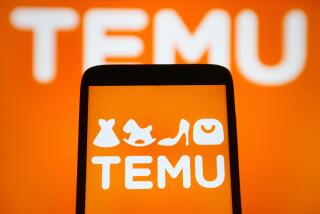The Hong Kong Game : CD-ROMs Raise the Stakes Over Bootlegging in China
- Share via
HONG KONG — In a crowded district of this trading city, near a street where old men still skin live snakes for winter soup, is a high-tech no-man’s-land on the front lines of a trade war.
In the labyrinthine aisles of the Golden Arcade shopping mall is a computer hackers’ haven, where tiny stalls are packed to the ceilings with bootleg software.
The illicit products are at the heart of a dispute between China, where the pirate programs are made, and the United States, which is threatening punitive sanctions if Beijing doesn’t clamp down on illegal copying of Western intellectual property such as software, music and movies.
Young men jostle to watch a demonstration of the latest computer game, blocking the arcade’s narrow walkways.
“This one’s good,” says a young Hong Kong man, stocking up on software before he returns to college in California. He plunks down $12 for a CD-ROM containing two popular games, “Relentless” and “Ecstatica.”
“Two for one--it’s so cheap!” he says, as a salesman slips the disk with its photocopied label into a black plastic bag. Then he whispers, “But they’re totally illegal, you know.”
He’s right on both counts.
Until recently, American concern about copyright infringement centered on music and video disc knockoffs. But an even greater problem looms: CD-ROM piracy. Illegal factories that once turned out poorly packaged Madonna compact discs are moving into the higher-tech--and higher profit--realm of pirated software.
A CD-ROM, which looks just like a music disc, boasts enormous storage space; one CD can hold the same amount of data as 1,500 standard 3 1/2-inch floppy diskettes.
That worries manufacturers like Microsoft Corp. They often find dozens of their programs worth several thousand dollars combined on a single shiny disc.
“It’s going to explode,” says Valerie Colbourn, legal counsel for Microsoft in Hong Kong and a vice president of an industry action group. “If we don’t get a grip on it now, it will lead to tremendous problems in the long term.”
American officials have demanded closure of 29 illegal factories in China, which produce about 100 million computer discs, mostly for export. If China does not demonstrate “serious resolve to eradicate rampant piracy” of American intellectual property by Feb. 4, U.S. Trade Representative Mickey Kantor says, America will impose sanctions against a range of Chinese products.
So far, government pressure has focused on music and laser discs.
But counterfeiters in the music business are quickly switching to where there is less scrutiny and bigger bucks.
The CD-ROM boom has just begun, but American software companies already lose as much to CD-ROM pirates as they earn from legitimate sales, the Software Publishers Assn. says.
With China importing between 500,000 and 700,00 personal computers a year, the potential profits are enormous.
But as CD-ROM piracy grows and manufacturers must compete against their own cut-rate products, losses will be even greater. One example: Autocad R12, a technical program that enables architects to design in three-dimensions, would cost $4,000 if bought legally. At the Golden Arcade, it goes for $100. And the chance to buy several expensive applications on one disc makes black market CDs almost irresistible, consumers say.
Canny bootleggers are quick to get new titles on the market--sometimes even quicker than the original manufacturer. At the Golden Arcade, CD-ROM buyers can find Microsoft’s “Encarta ‘95,” which hasn’t been released yet in Hong Kong, or even Lotus’ word-processing package “Ami-Pro”--which Lotus hasn’t produced on CD-ROM.
The Chinese producers are ahead on marketing, too, combining top-selling titles for lower prices, even customizing CD-ROMs. Armed with a menu of top-selling software and a portable $7,000 desktop recorder, Golden Arcade hustlers can create a made-to-order disc with dozens of programs while you wait.
One popular ready-made disc, selling for $19, is a police game double bill: “Blue Force” and “Daryl F. Gates Police Quest: Open Season.”
Enforcement officials could learn a thing or two from the police games.
When the Hong Kong Customs and Excise Department staged a raid on the Golden Arcade in mid-December, lookouts posted at the entrances with cellular phones gave their cohorts a warning.
By the time the police arrived, most of the stalls were shuttered and the salesmen were gone for an extended lunch, officials say.
Customs agents seized thousands of illegal materials. But several days later, business continued as usual.
The real problem, officials say, is not the retailers, but the manufacturers in China. American trade officials have demanded the closure of 29 factories that make unauthorized products--any Chinese factory that puts out U.S. software is automatically on the blacklist, since no U.S. computer company has licensed software production in China.
But Beijing seems to be dragging its feet.
“It’s not so easy to just shut the factories down,” says Zhou Zhenwen, of China’s State Council-sponsored piracy task force.
He concedes that many of the companies are state-run and that some have connections to high-ranking officials: “There exists some personal interest in the provinces.” But connections aren’t good enough to keep the factories open if they prove to be infringing copyrights on a large scale, says Zhou--the problem is insufficient proof.
The task force, however, is not investigating those 29 factories. “There is no need,” says Zhou. “Since the U.S. has pointed them out, we can see they have already obtained evidence of infringements.”
But when asked if the 29 would be shut down, he says that because the task force hasn’t investigated them, he doesn’t know if there’s enough evidence.
(BEGIN TEXT OF INFOBOX / INFOGRAPHIC)
Software Piracy
Counterfeit units of software as a percentage of total units sold for 1993:
France: 52%
Germany and Austria: 33
Italy: 61
Sweden: 38
Switzerland: 45
Britain: 27
United States: 33
Hong Kong: 64
Korea: 89
Taiwan: 82
Japan: 47
Source: Software Pyblishers Assn.






